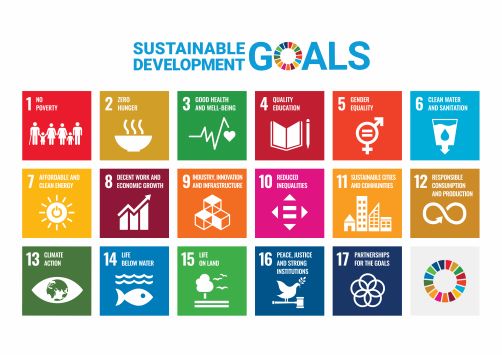Sustainable Futures Enterprise Challenge
Working together, making a difference
The Sustainable Futures Enterprise Challenge sees small teams of students from institutions around the world work together to improve their enterprise skills, explore the UN Sustainable Development Goals, and pitch ideas to to support their university's work towards the UN Sustainable Development Goals.
Selecting one or more of the UNSDGs to focus on, develop a proposal for your university to implement which will help the university get closer to your chosen goals by 2030.

The 2023 challenge
The 2023 challenge is now over, but please look out for updates on the 2024 challenge, which will launch in the summer. Until then, you can find out more about the 2023 challenge below!
The sustainable futures challenge involves students from Nijmegen School of Management, Radboud University, Netherlands, the University of the West Indies in Cave Hill, Barbados, and the Universidad de los Andes, Colombia. Students from the all universities students address the same challenge question in the context of their own University setting, and pitch their ideas digitally. The challenge is aimed at undergraduate students, though students at all levels can participate in majority undergraduate teams.
This challenge is a great opportunity for you to:
- show your commitment to social and environmental justice
- come up with ideas that can support your university to address the UNSDGs
- develop employability skills that you can add to your CV
- engage with students from global partners
- make new friends at Newcastle University
Entries are judged across all the universities by academic staff. We hope to identify real life solutions to SDG challenges that universities can adopt, and winners will have the opportunity to discuss making their proposal a reality within their own universities.
All students from across the universities are invited to attend a virtual Global Celebration Forum where the winning teams are announced. The celebration event will be an opportunity to hear how other teams have addressed the challenge and to listen to expert speakers discuss the importance of the UNSDGs for universities and beyond.
Inspiration and information
You can see some of the excellent work from the 2022 challenge, and top entries from 2023:
- 1st place: Increasing Inclusivity
- 2nd place: New Life
- 3rd Place: Urban Agriculture
You can also hear from the Newcastle winners when they spoke the Newcastle University Courier
Other examples include proposals for:
- a system enabling students to select their own pronouns. (SDG 5: Gender Equality)
- a water bottle donation scheme with incentives (SDG 6: Clean Water and Sanitation)
- a ‘Fight for Zero Hunger’ 10 credit module, available to all students. (SDG 2: Zero Hunger)
- a bottle bank scheme, where students are rewarded for recycling plastic bottles (SDG 12: Responsible Consumption and Production)
You will find everything you need to guide you and your team through the challenge on these pages, including guidance on tackling an Enterprise Challenge, making a pitch, and lots of helpful information about the UNSDGs and Newcastle University's Sustainable Campus.
Please note:
- Teams must have a minimum of three people, and a maximum of eight.
- At least 66% of team members should be undergraduates.
- you can register with your own team, or we can help you find team mates, please just let us know when you register.
Sorry, you need JavaScript to view this video
Teamworking
Working in a team
This might be your first time working in a team whilst at University, or working with people outside your course. You will learn a lot about what it is like working with others, and how you yourself contribute to a team.
Leadership
It's not necessary to have a designated team leader, so long as one person does submit your final pitch! However, it can be helpful to have set roles when you meet, for example, to make sure you aggree what you want to achieve when you meet together, and to move the discussions along so ou don't run out of time! Similarly, when you finish talking, someone should make sure everyone is clear on who is responsible for specific actions, and any deadlines. Agree each time you meet who is going to take on these roles - it might be one person who naturally takes responsibility for this, or you could rotate so everyone has the experience.
Collaborating at a distance
Working remotely and collaboratively has become more common, so feel free to use a plend of remote/ and in person collaboration. We recommend using Microsoft Teams, which you can access through your Newcastle University log-in, to create a forum for your collaboration, sharing files and messages, and any online meetings. You can also use the university campus spaces to meet in person, but however you meet, please remember to be mindful of everyone’s commitments and timetables, and their preferences (not everyone is an early riser or a night owl!)
Analysing and understanding the challenge task
As a reminder, your task is: "Selecting one or more of the UNSDGs to focus on, develop a proposal for your university to implement which will help the university get closer to your chosen goals by 2030"
Step 1: Pick an SDG to focus on
As a group, you are invited to select the SDG you are most passionate about working on for the challenge.
"The United Nation's Sustainable Development Goals are a universal call to action to end poverty, protect the planet and improve the lives and prospects of everyone, everywhere. The 17 Goals were adopted by all UN Member States in 2015, as part of the 2030 Agenda for Sustainable Development which set out a 15-year plan to achieve the Goals."
This video about the SDGs, created by the United Nations, focuses on the solutions and action we need to tackle poverty, inequality, injustice and climate change. You can also look at the UK Government's responses to the SDGs.
The RELX SDG Resource Centre has a variety of inspiring resources, including videos, webinars, podcasts and reports covering a variety of projects tacckling the SDGs
Step 2: Research the university
What is the university already doing, and can you see any gaps or ways to improve? Newcastle University is a big organisation, and there will be parts you have nexer considered or explored. This is a perfect opportunity to understand and familiarise yourself with your place of study and to help you in approaching the challenge. Look here to get you started:
- LibGuides - Sustainability
- Newcastle University - Sustainable Campus
- Global Challenges Academy - Meeting UN Sustainable Develeopment Goals
- Newcastle University - Who We Are
- Newcastle University - Student Home Page
Step 3: Be inspired by previous ideas
You can see some of the excellent work from the 2022 challenge, and previous examples include proposals for:
- a system enabling students to select their own pronouns. (SDG 5: Gender Equality)
- a water bottle donation scheme with incentives (SDG 6: Clean Water and Sanitation)
- a ‘Fight for Zero Hunger’ 10 credit module, available to all students. (SDG 2: Zero Hunger)
- a bottle bank scheme, where students are rewarded for recycling plastic bottles (SDG 12: Responsible Consumption and Production)
Idea Generation
There is a myth that only ‘creative’ people can generate ideas. This is not true! We all have the capacity to generate ideas, as we all have both a left and right side of our brains. However, a lot of us have difficulty in accessing the right, the more creative brain. However, certain factors can help us do this:
Being in a collaborative group.
- Group work fosters creativity as you can get inspired by others and add to ideas generated by the group.
- Knowing that there is an assessed result, and a potential prize can help generate creative thinking.
Being in a competitive environment.
- Such as a challenge competing against students from other universities!
Being in a timed scenario.
- Having a deadline can force us to create, instead of procrastinating.
These factors can help to push individuals and teams from a blank sheet of paper, to a range of creative ideas, to one clear concept to base their proposal on.
This video from Newcastle University's careers service gives you some ideas of how to go through that process with your team. The information under the video includes more resources and advice.
Developing your idea
Once you have the workings of your idea, you will need to develop it further. We are not expecting a full working model, campaign, or product. We are only expecting to see some further detail of your idea. The questions below will help you do this.
- Route issue – what does your solution address?
- Innovation – how is this a unique idea?
- Target market – who exactly will you target? Why will your idea work for them?
- Viability – how would it work in practice? Who are your key partners? What are your estimation of costs? What resources are needed?
Presenting and submitting your final idea
What to submit
As noted, you are not expected to finalise a finished product, service, process or campaign. You are expected to explore, develop and outline your idea for the judges. Your submission should give a comprehensive overview of:
- What problem your idea is solving – what route issue did you identify?
- Your idea – a summary of your solution to the route issue
- How and why is it innovative – what makes it different?
- Your target market – a breakdown of who this idea is for
- How it will work – key partners, estimation of costs, resources needed
This video give some advice on preparing your pitch. Again, you'll find more resources and advice links under the video.
You and your team need to choose the best format for your pitch. There is no right or wrong choice, we encourage you to pick the medium that will best convey your idea and help yours stand out. Remember, judges will be looking at many submissions. It is important to cover all the questions asked of you, but:
- Do not go into too much detail
- Keep it visually engaging
- Remember what we are looking for
Judges will use these Judging Criteria SDG Challenge to select the winners. They are looking at a combination of the workings of your idea and how it is presented. The more you can follow the guidance, the better you will score.
Please make sure that this work is yours and your teams - see good academic practice and plagiarism for guidance.
How to submit
A nominated member of your group should upload the final submission on behalf of the group by 11:30am on 23 October 2023. Please use the submission button below. You can submit a link to e.g. YouTube, Vimeo, Soundcloud etc. for audio or video content, or a file of your PowerPoint, Sway, Prezi, pdf document etc. Please note each file is a maximum of 1GB, and you can submit up to two files, but we do encourage you to be brief - any video/audio or presentation should be approximately 3-7 minutes long.
What next?
Once you have submitted, you are done! Many congratulations on completing the challenge. Your submission will be assessed by the judging panel, and finalists notified by Tuesday 31 October, and invited to present their proposals at our Sustainable Futures Forum on 8 November 2023, where the winners will be announced.
